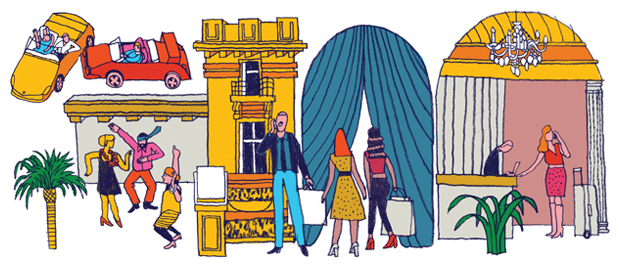“We have upgraded you to a suite, Madame,” says the perfectly-coiffed receptionist. “Allow me to show you the way… Alfonse will take your suitcase.” Alfonse appears in a silent, well-mannered flash and relieves me of my luggage before retreating.
The air-conditioned lobby of the Hôtel Hermitage is delicately scented with gardenia, freesia, orchids, and roses that spill along the pastel-painted furniture.

Art by Josh Cochran
La receptioniste tells me that, due to the hotel’s swimming pool being closed for pre-season repairs, I can use the usually exclusive Monte-Carlo Beach Club if I fancy a dip.
A text message arrives: “Come on! We’re at the ‘Welcome to the Conference’ beach party! Loads of drunk fund managers… Not seen any asset owners yet.” I read it as I am led through the hotel corridors, which are empty but for the occasional staff member who bows and utters a “bonsoir.” Once outside the hotel, I inform a journalist friend that I am on my way. I head past Louis Vuitton and Chanel boutiques towards the Café de Paris and on to the seashore.
It is easy to be cynical about Monte Carlo: The residents are in (self-imposed) financial exile and the visitors are transient. Once you’re installed there, it’s very difficult to leave—unless you want to start paying eye-watering tax bills—and there are high hurdles for those wanting to make their stay more permanent.
This week, I am one of those fleeting visitors to a conference about fund management—specifically, the future of fund management. According to the agenda there is one institutional investor presenting amid swathes of representatives from fund managers, private banks, fund selectors, and other service providers to the industry.
As we sip ice cold lager and the Mediterranean laps around the jetty upon which our party is being held, we are surrounded by hundreds of these industry types enjoying the hospitality. A constant stream of wait staff brings a constant stream of drinks as a band plays constant rock anthems with new lyrics about fund management regulation. No, really.
Before too long there are ties around foreheads and a kind of stumbling hokey-cokey on the dance floor, so we retreat back to downtown Monte Carlo to pay for our own beer (for a change).
An arched eyebrow from a pristine door attendant is enough to turn us away from the Cipriani (well, that and the price list). We settle for a dingy Irish bar, which is showing the World Cup.
Flash forward 20 hours. We are traipsing through the streets attempting to find succour after a gruelling day listening to how asset managers are going to change asset management (so asset owners will presumably give them more assets to manage).
At one end of the principality we are told that we are not allowed into a party being hosted alongside the conference—but not, it should be noted, by the organisers—as we are not on the guest list. We shrug and ask to for a cab to be called. This is met by a look of disdainful disbelief.
A friendly bunch are hosting another conference party on a roof terrace overlooking the sea. “Oh, I’m sorry, no journalists allowed,” says one.
“Why not?”
“I’m not sure; we’ve just been told not to let any member of the press in.”
We leave the roof and the silhouetted revellers—ties are already adorning some foreheads—and return to our dingy Irish bar.
“Amici,” says the barman, “The football? We have a table…”
We sit next to a group of bronzed—and admittedly fairly aged—Adonises, all English, and all jostling for the best spot to watch the World Cup.
“Thank God for this place, John,” says one. “You getting the first round?” More of them arrive in tailored shorts, expensive polo shirts, and loafers, and consume buckets of beer and white wine.
I don’t bother with the conference the next day—I didn’t need to hear about how regulation was going to hurt managers’ ability to gather assets. Instead I drive through the side of Monaco that no tourist usually sees—the part where real people work, businesses provide mundane services such as photocopying and key cutting, and where a huge football stadium sits right in the middle of town. I am then dropped off at the heliport.
In the waiting area, the Rotary Club of Monaco has a collection to fund the eradication of polio. Among the paper money that has been thrust in are notes from Mexico, Russia, and Turkey.
“Maybe it’s not just all for show here,” I think as I clamber into the chopper with a wealth manager from Luxembourg. “I wonder how much 100 roubles is worth—and what is a yuz bin?”
The Nice airport’s internet tells me: around €8. And the Turkish note went out of circulation sometime in the last decade.
